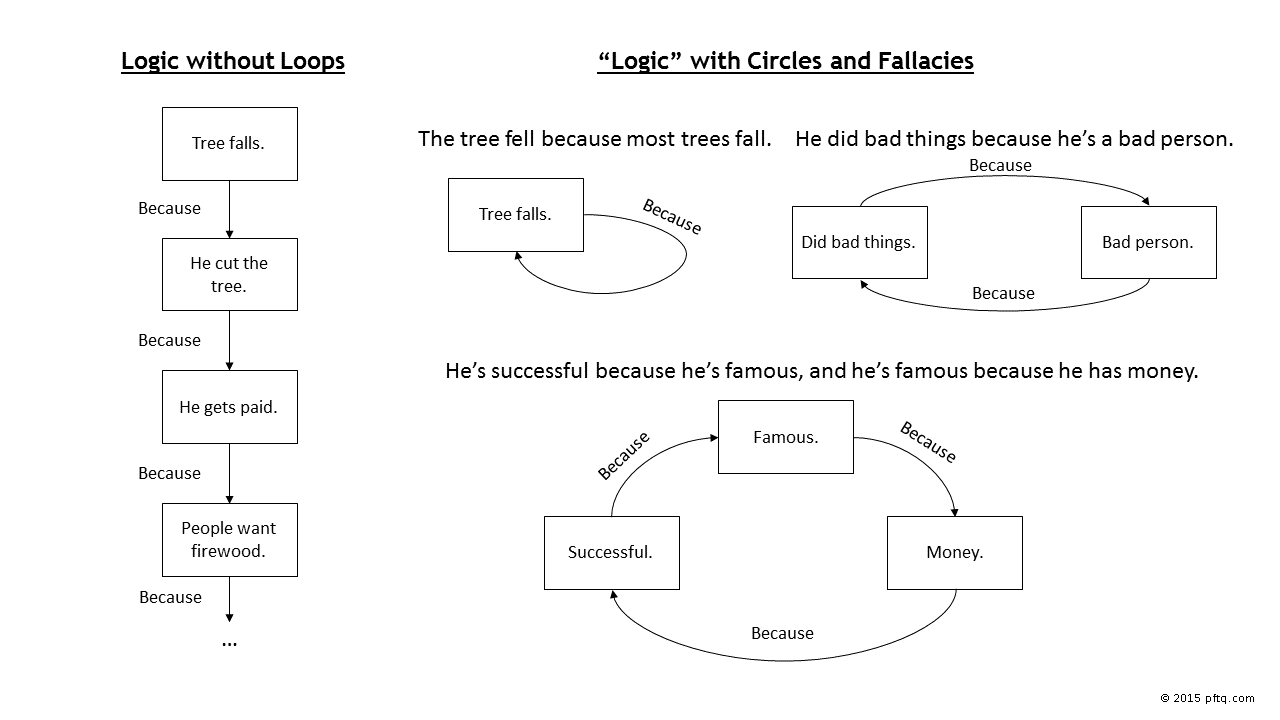Data Does Not Equal Fact
Data!=Fact: Inductive vs Deductive Reasoning - Original published on January 24, 2018 at https://www.pftq.com/blabberbox/?page=Data_Does_Not_Equal_Fact
Part of my frustration with the emphasis on big data, statistics, data driven, and numbers in general is that these are all forms of inductive reasoning. Many seem to not understand that inductive reasoning only provides an estimate of world. It does not and cannot prove anything. Evidence alone does not provide truth. Data does not equal fact.
There are two main forms of reasoning: inductive and deductive. Inductive reasoning is the process of generalizing from a few observations to a broad conclusion. Deductive reasoning is the process of understanding what must be true and apply to something more specific given a premise or broader assumption. The former emphasizes correct observation while the latter emphasizes actual logical flow and reasoning, the how and why as opposed to just what it is you are seeing. Only deductive reasoning is actually logical, but the phrase logic is often misused to describe both.
Inductive Reasoning
Inductive reasoning is backwards looking and by definition says nothing of the future. You start from seeing one thing and then try to generalize to something you haven’t seen before, but you can never be fully sure. The easiest way to identify it is it almost always depends on evidence, concrete numbers, quantitative data, statistical sampling - stuff that you can measure. It is useful for describing many things together, giving a big picture from high up of what’s happening on the ground, but people seem to forget that no matter how large the sample size is, it never is absolute. Everything always boils down to a probability as opposed to a cause and reaction. Even in the most introductory statistics class, the teacher tells you correlation is not causation.
Yet we have phrases like “social validation,” “empirically proven,” or “statistically impossible.” In Silicon Valley, the thought is that if the data suggests a conclusion with high enough statistical significance, then it must be true unconditionally. They won’t even look at you if you don’t have data to back your conclusion, if your ideas are not “data driven.” Similarly, in Wall Street and academia, the thought is that if the biggest names or majority of people are doing things one way, it must be the right way. One of the most frustrating things in college for me was having actual professors tell students that a theory doesn’t need explaining because it’s always worked. Things are true just because they work and have always worked.
Deductive Reasoning
Deductive reasoning is more abstract (harder) and less about the numbers, if at all. It drills down and keeps asking why at every level, on the ground as opposed to from a distance. It is forward-looking, in that you pro-actively think out how something *must* work rather than just observe that something *does* work - an objective truth independent of observation. Tesla, Einstein, and many other scientists are famous for having come to their ideas through sheer mental simulations and thought experiments rather than physically observing - General Relativity, for example, is still being confirmed decades after the theory came out first (and was largely dismissed until there was evidence). The clearest example of how this differs from empirical / observation-based reasoning might be one from my own life on how I compare different routes through a city grid; an inductive reasoning approach would try all possible paths, but if you visualize and manipulate the grid in your mind, you realize all paths are the same.
Some will ask, how do you know something *must* work or *why* something works? How do you know what’s logical? A lot of people simply do not believe there is such thing as objective truth in this manner; I’ve had people from college literally try to argue that even math only works because everyone agrees on it, that 1+1 only equals 2 because everyone believes it does, and that it’s just as susceptible to being “right until it’s wrong.” Much of it comes down to understanding logical fallacies, but the gist of it is that any reason you come up with should not create a circle back to itself (aka infinite loops). Pretty much any logical fallacy can be identified by asking why and realizing if the reason leads you in a circle. This is what happens with inductive reasoning because at the end of the day, you’re only describing what you see; it’s observation piled upon observation without explanation or looking beneath the surface. With deductive reasoning, you keep going deeper and deeper down the cause-and-effect chain, which may not necessarily ever end but being able to move from point to point without going in circles, without contradicting yourself, is what logic is about. It doesn’t automatically mean something is true, but if you’re wrong, you know it’s from the observations/evidence, which then is the right place for inductive reasoning to come in.
Inductive vs Deductive Reasoning
Inductive reasoning describes what *is*. Deductive reasoning explores what *if*, the how and why. Put in simple terms, you use inductive reasoning to gather your information, but you use deductive reasoning to understand and interpret it. The data gives you eyes, but you’ve got to use your brain to make sense of it. Unfortunately, more and more it seems we blindly lump them together as equal approaches to logic, almost as if it’s just a matter of preference for what the user is comfortable with when one is actually completely useless without the other.
Misuse of inductive reasoning essentially amount to misuse of statistics. Especially in tech and finance, there is this bizarre assumption that an anomaly will never happen, and if it does, it somehow does not count. They’ll point to the 99 other times things succeed, but they don’t seem to fully grasp that they only get to live in one life, that the outcome is discrete. You see decisions based on “expected value,” where they’ll take the decision with the highest weighted average of outcomes, even if it includes the potential outcome of death - but they don’t care because the probability is so small that it’s “statistically impossible.” There is no back-up plan, no acknowledgement whatsoever that the improbable could happen. The entirety of Blockchain, for example, is based on assumptions like no two people ever drawing the same random number for a wallet, even though there’s nothing that says they can’t and nothing that checks if they do. They say that the odds are so low that it would take a billion years to happen, but the last I checked, that’s not how probability works. It could happen tomorrow, and that would be the end of it. Again, they ignore that you only get to live with one discrete outcome, and once something happens, it’s done, it’s over. You don’t get to live in the weighted average of the possibilities. That’s not a real number. It’s literally made up.
On the opposite side of that are people who simply can’t recognize what’s right in front of them unless they get a thousand other opinions or datapoints to confirm it. Their own house could be on fire, but they’d sooner check Twitter than look with their own eyes. The purpose of inductive reasoning and statistics overall is to make it easier to think about large amounts of data as an estimate. It’s for zooming out to the big picture and thinking about what a hundred things will do overall. It’s wrong when you try to drill down and apply it to just that one thing in front of you. Formally, it’s the fallacy of affirming the consequent.
A great quote that illustrates all this comes from the movie “I Origins”:
“If I drop a phone 1000 times, and one of those times it doesn’t fall, that it just hovers in the air, then that is the one datapoint that matters.” (Paraphrased)
If you only used inductive reasoning, you’d need to be hit by a car 20 times before you know it hurts. If you used deductive reasoning, you’d know not to be hit in the first place, not because you magically predict the future but because you are trying to think and imagine what could happen. It’s not luck or selection bias. People live this everyday. You don’t get to redraw your life from a hat.
========================
Original published on January 24, 2018 at https://www.pftq.com/blabberbox/?page=Data_Does_Not_Equal_Fact


